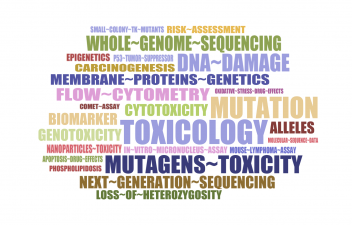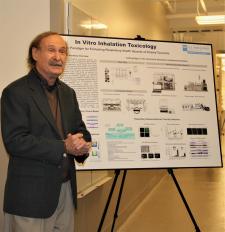NCTR Division of Genetic and Molecular Toxicology Also referred to as: DGMT
Division Director: Robert Heflich, Ph.D.
Division Research Themes
- Develop and validate regulatory genetic-toxicology assays.
- Conduct chemical-specific research.
- Develop new paradigms for regulatory decision-making that integrate measures of genetic risk with biomarkers of toxicity by conducting research to develop:
- Relevant biological models.
- Comprehensive approaches to monitor genetic variation using technologies such as Next Generation Sequencing.
- Better ways of evaluating data to determine human risk.
Division scientists actively participate in FDA committees and international working groups that form consensus on how to conduct regulatory genetic-toxicology testing. International working groups include: International Workshop for Genotoxicity Testing (IWGT), the Organization for Economic Cooperation and Development (OECD), and the Health and Environmental Sciences Institute (HESI). Division scientists will continue to be involved in discussions concerning the appropriate strategies for conducting risk-assessments of regulated products.
Research Strategies
- Engage FDA product centers (CDER, CBER, CDRH, CVM, CTP), NIEHS/National Toxicology Program, Health and Environmental Science Institute (HESI) and other national and international organizations to set research priorities.
- Develop better biological models for assessing human risk (3-D human in vitro systems).
- Develop more comprehensive approaches for monitoring genetic variation (Allele-specific Competitive Blocker-Polymerase Chain Reaction [ACB-PCR], Next Generation Sequencing [NGS], Digital Display-Polymerase Chain Reaction [ddPCR]).
- Develop better ways of evaluating data to determine human risk (Dose response curves, Bench Mark Dose [BMD], Point of Departure [POD]).
2019 Select Accomplishments
- Developed a minimally invasive gene mutation assay, Pig-a, to identify mutagens using a single drop of blood and established an error-corrected next generation sequencing (EC-NGS) to evaluate Pig-a mutation in bone marrow erythroid and granulocyte precursors. Find more information in the journal, Mutation Research.
- Collaborated with FDA’s Center for Devices and Radiological Health to evaluate cancer driver mutations as quantitative biomarkers of cancer risk using EC-NGS and allele-specific competitive blocker PCR (polymerase chain reaction). Find more information in the journal, Environmental and Molecular Mutagenesis.
- Developed a rapid, sensitive EC-NGS method for quantifying cancer driver mutations. While easy to perform manually, the method is also suited for robotic handling and batch processing of samples. This facilitates detection and quantitation of carcinogenic biomarkers before tumor formation or in normal-appearing tissue. Find more information in the journal, Toxicological Sciences.
2020 Select Research Projects
- Immunotoxicity Assessment of Nanomaterials Using Human Immune Cell-Based Biomarkers of Innate Immunity
- Somatic Oncomutations as Biomarkers for Translating Preclinical Safety Data to Human Cancer Risk
- Validating the Rat Pig-A Assay for Regulatory Use: Determining the Molecular Basis of Mutants Detected in the Rat Pig-A Gene Mutation Assay
- Developing an In Vitro System to Evaluate the Disease-Related Toxic Effects of Inhaled Test Agents in Human Airway Tissue Models
- Evaluating the Toxicity and Inflammation Produced By Cigarette Smoke Using Human In Vitro Airway Models
- Developing FDA ddPCR Expertise, Training Opportunities, and the Means to Validate Low-Frequency Oncomutation Measurements
- Advance Safety Assessments of FDA-Regulated Products Using High-Throughput and High-Content Quantitative Approaches in Cultured Human Cells to Evaluate Genotoxicity
- Development and Characterization of In Vitro Testicular Models and Male Reproductive Microphysiological Systems (MPS)
Resources For You
Contact Us
- NCTR
- National Center for Toxicological Research
Food and Drug Administration
3900 NCTR Rd
Jefferson, AR 72079
-
Hours Available
- (870) 543-7121


